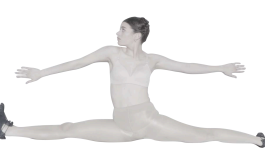Marla Francis was born from an act of naming.
A chosen name, not an inherited one.
A way to rewrite her own story and free herself from what had been assigned language, genealogy, expectations.
At first, she seemed a fiction, a mask.
But like in rituals, the mask does not conceal it summons.
Marla was born to bring out a part of me that had been silenced by education.
Raised in a Catholic girls’ boarding school, I had learned to be a good girl orderly, proper, compliant.
That education shaped not only my behavior but also my aesthetics an ideal of grace and
modesty that defined what could or could not be shown.
Marla arrived as an act of provocation: a body that plays with sacred symbols in order to
profane them, giving ambiguity back to the gesture and fierceness back to femininity.
Through her, I could rewrite that grammar turning control into irony, modesty into presence, and rule into play.
Over time, the boundary between invention and life dissolved: the fiction began to breathe, and the name became body, voice, practice.
From that birth, others followed.
I Figli di Marla (The Children of Marla) are not a company but an extension bodies that share a way of being in the world, a trust in vulnerability as a creative space.
Through the practice of Emotional Dance, Marla opens herself to others and guides them in a form of reciprocal generation, where the material is one’s own story, emotion, and memory.
Each encounter is a birth: of a gesture, a face, a new way of inhabiting the body.
To be Marla Francis is not to play a role.
It is an ongoing process of transformation, a practice of life.
It is not about representation, but about allowing oneself to be traversed to turn what one is into a shared language.
It is crossing the threshold between truth and fiction, until only presence remains.

Marla Francis was born from an act of naming.
A chosen name, not an inherited one.
A way to rewrite her own story and free herself from what had been assigned language, genealogy, expectations.
At first, she seemed a fiction, a mask.
But like in rituals, the mask does not conceal it summons.
Marla was born to bring out a part of me that had been silenced by education.
Raised in a Catholic girls’ boarding school, I had learned to be a good girl orderly, proper, compliant.
That education shaped not only my behavior but also my aesthetics an ideal of grace and
modesty that defined what could or could not be shown.
Marla arrived as an act of provocation: a body that plays with sacred symbols in order to
profane them, giving ambiguity back to the gesture and fierceness back to femininity.
Through her, I could rewrite that grammar turning control into irony, modesty into presence, and rule into play.
Over time, the boundary between invention and life dissolved: the fiction began to breathe, and the name became body, voice, practice.
From that birth, others followed.
I Figli di Marla (The Children of Marla) are not a company but an extension bodies that share a way of being in the world, a trust in vulnerability as a creative space.
Through the practice of Emotional Dance, Marla opens herself to others and guides them in a form of reciprocal generation, where the material is one’s own story, emotion, and memory.
Each encounter is a birth: of a gesture, a face, a new way of inhabiting the body.
To be Marla Francis is not to play a role.
It is an ongoing process of transformation, a practice of life.
It is not about representation, but about allowing oneself to be traversed to turn what one is into a shared language.
It is crossing the threshold between truth and fiction, until only presence remains.
